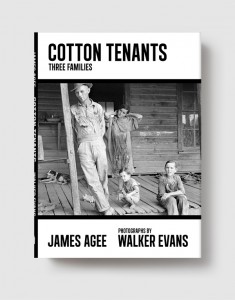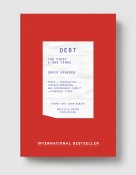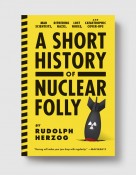
List price: $24.95
- Pages224
- ISBN9781612192123
- Publication dateJune, 2013
- Categories
- Booksellers
- Media
- Academics & Librarians
Cotton Tenants
Three Families
James Agee
Photographs by Walker Evans
”A masterpiece of the magazine reporter’s art. It is lucid, evocative, empathetic, deeply reported, consistently surprising, plainly argued, and illuminated, page after page, with poetic leaps of transcendent clarity.” —Fortune
A re-discovered masterpiece of reporting by a literary icon and a celebrated photographer …
In 1941, James Agee and Walker Evans published Let Us Now Praise Famous Men, a 400-page prose symphony about three tenant farming families in Hale County, Alabama, at the height of the Great Depression. The book shattered journalistic and literary conventions. Critic Lionel Trilling called it the “most realistic and most important moral effort of our American generation.”
The origins of Agee and Evans’s famous collaboration date back to an assignment for Fortune magazine, which sent them to Alabama in the summer of 1936 to report a story that was never published. Some have assumed that Fortune’s editors shelved the story because of the unconventional style that marked Famous Men, and for years the original report was presumed lost.
But fifty years after Agee’s death, a trove of his manuscripts turned out to include a typescript labeled “Cotton Tenants.” Once examined, the pages made it clear that Agee had in fact written a masterly, 30,000-word report for Fortune.
Published here for the first time, and accompanied by thirty of Walker Evans’s historic photos, Cotton Tenants is an eloquent report of three families struggling through desperate times. Indeed, Agee’s dispatch remains relevant as one of the most honest explorations of poverty in America ever attempted and as a foundational document of long-form reporting. As the novelist Adam Haslett writes in an introduction, it is “a poet’s brief for the prosecution of economic and social injustice.”
Co-Published with The Baffler
—Read an excerpt from Cotton Tenants on Slate—
—Listen to John Summers and Adam Haslett discuss Cotton Tenants on WNYC’s Leonard Lopate—
Slate picks Cotton Tenants for the 21 Best Lines of 2013!
A Maclean’s Top 20 Book for 2013
“Agee generally portrays the primitive lives of the tenants with realism coupled with a literary flair, as well as sense of humor… Cotton Tenants still packs a punch!” —History News Network
“An extraordinary work of literature and social conscience, Cotton Tenants is a short but powerful work.” —the Daily Herald (Provo, UT) on Cotton Tenants
“Agee’s gaze is compassionate, keen… What we see is not merely a poet looking at poverty, but one learning to navigate his gifts, who merges into everything he sees.” —Parul Sehgal, choosing Cotton Tenants as one of 5 Forgotten Classics Worth Revisiting on NPR
“The piece had never been published in book form until this year, when the folks at Brooklyn indie publisher Melville House put out this very important work.” —Flavorwire, Top 10 Nonfiction Books of 2013 So Far
“A wonderful piece of writing…an example of what documentary journalism can do as an organ of social justice.” —Kirkus Reviews
“It is a pleasure to report that Agee’s work is entirely deserving of our praise. The stark, haunting photographs by Walker Evans, some of which had never been published, embody what critic Hilton Kramer called ‘the moral and aesthetic texture’ of the era. Cotton Tenants demonstrates the pleasure to be found, as Agee writes in these pages, when someone does ‘the work he cares most to do and is best capable of doing.’” —the Washington Post
”Agee squabbled with his editors over what he felt was the exploitation and trivialization of destitute American families…. What readers are about to discover now is what all the fighting was about.” —Christine Haughney, The New York Times
”A more accessible take on Agee’s Alabama trip, offering a sublime showcase for his frequently masterful prose style.” —Danny Heitman, The Christian Science Monitor
”This book belongs among his highest achievements…Cotton Tenants stands as James Agee’s more powerful depiction of poverty and the moral lapse that perpetuates it. We can’t have too many artful reminders of this failure, and few are as artful as this.”—American Prospect
“An invaluable addition to the Agee shelf…Agee and Evans recognized that art and memory conjoined are the only true bulwarks against the obliteration of all we hold dear about the past.” —Malcolm Jones, The Daily Beast
”Highbrow” and ”Brilliant”—New York Magazine’s approval matrix
”Cotton Tenants reads with the spare and measured beauty of a writer who knows that under the social circumstances he can only allow himself so much. It is a deeply moving work…Cotton Tenants is fresh and painful reading.” —The Awl
”That’s the first thing to be said about this essay: Fortune was crazy not to run it. It was a failure of nerve, and a lost chance at running one of the great magazine pieces from that era.”—John Jeremiah Sullivan, Bookforum
”The new book is a more accessible take on Agee’s Alabama trip, offering a sublime showcase for his frequently masterful prose style…the virtues and complication of “Cotton Tenants” stand on their own, making the book memorable in its own right.”—Christian Science Monitor
”“Cotton Tenants,” a rare discovery, adds another chapter to [James Agee’s] enduring Southern literary achievements, more than a half century after his death.”—Knoxville News Sentinel
“An all-in, embracive rendering, panoramic as Brueghel while typecasting like Ben Shahn…. Agee may be our foundational maximalist, the progenitor of Norman Mailer, Thomas Pynchon, and David Foster Wallace.”—Thomas Larson, The Los Angeles Review of Books
”A paragon of lyrical realism, the book is a legend…Agee writes with clinical, angry precision.” —The Boston Globe
“A few sentences in Cotton Tenants reappear in Famous Men, but the framing of the whole is much more focused on the economic vise that holds all—tenant and landlord alike—in its grip. It is a worthy work in its own right.” —Columbia Journalism Review
“Cotton Tenants is a compact and clear-eyed work, detailing the desperate situation of the Southern sharecroppers with sober detachment. It’s so perfect an account of social and economic injustice that it has a timeless quality: although written over 70 years ago, it seems to have lost none of its force or relevance.” —The Skinny
”It is a time capsule: open it and you are transported to ”a brief account of what happens to human life”…honest, unflinching, and brilliant prose.”—Publishers Weekly
”Agee’s discerning eye, crushing bluntness, and forward-falling prose poetry urge along before dunking readers’ senses, again and again, into the families’ way of life. Disdainful of sentiment and melodrama, Agee shows no bias, revealing his subjects and skewering both oppressors and supposed reformers.” —ALA Booklist
Praise for James Agee and Let Us Now Praise Famous Men
“A book of wonders—an untamable American classic in the same line as Leaves of Grass and Moby-Dick.”—David Denby, The New Yorker
“Let Us Now Praise Famous Men is . . . a classic work, an exercise in pure, declarative humanism. It will read true forever.”—David Simon, creator of The Wire
“The most copiously talented writer of my generation.”—Dwight Macdonald
“[James Agee’s] work continues to feel so vital just because it remains so nakedly vulnerable, so provisional, so utterly lacking in that subtle artistic poison of self-confident complacency . . . He honestly does seem something close to the James Dean of American literature.”—Michael Dirda, The Washington Post
“The most realistic and most important moral effort of our American generation.” —Lionel Trilling
“The most remarkable regular event in American journalism today.”—W. H. Auden




